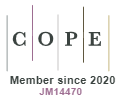Motivational profile and mood in running group participants
DOI:
https://doi.org/10.5585/conssaude.v18n4.14826Keywords:
Motivation, Running, Psychology sportAbstract
Introduction: Increasing attention is being paid to street running race practice, and a better understanding of the practitioner profile can help participants adhere to the practice of physical activity.
Objective: To investigate the motivational profile and mood of street runners.
Material and Methods: 50 participants in a street race event were evaluated. Motivation and mood were assessed after the race using the IMPRAF-54 and POMS questionnaires, respectively. The dimensions of motivation were assessed using the Wilcoxon test, and mood was analyzed in a descriptive approach.
Results: The dimensions most present in motivation were health and pleasure. For mood, an iceberg profile was observed.
Conclusion: Based on the results, the street runners in this study presented a motivation of the pursuit of health and pleasure in the practice of street running; in addition, the practitioners showed a positive mood.
Downloads
References
American College of Sports Medicine/Diretrizes do ACSM para os testes de esforço e sua prescrição; tradução Dilza Balteiro Pereira de Campos. – 9. ed. – Rio de Janeiro: Guanabara; 2014.
Conn VS, Hafdahl AR, Brown LM. Meta-analysis of quality-of-life outcomes from physical activity interventions. Nurs Res. 2009;58(3):175–183.
Lima DF, Lima LA, Silva MP. Tendências temporais dos tipos principais de exercício físico e esporte praticados no lazer na cidade de Curitiba, Brasil: 2006-2014. R. bras. Ci. e Mov. 2017;25(3):98-105.
Bigliassi M, León-Domínguez U, Buzzachera CF, Barreto-Silva V, Altimari LR. How does music aid 5 km of running? Journal of Strength and Conditioning Research. 2015;29(2):305-314.
Kemi O, Wisløff U. High-intensity aerobic exercise training improves the heart in health and disease. J Cardiopulm Rehabil Prev. 2010;30:2–11.
Salgado JVV, Chacon-Mikahil MPT. Corrida de rua: análise do crescimento do número de provas e de praticantes. Revista Conexões. 2006;4(1):100- 109.
Dallari MM. Corrida de rua: um fenômeno sociocultural contemporâneo. São Paulo. Tese [Doutorado em Educação] – Faculdade de Educação, Universidade de São Paulo; 2009.
Truccolo, AB, Maduro PA, Feijó EA. Fatores motivacionais de adesão a grupos de corrida. Motriz: Revista de Educação Física. 2008;14(2):108-114.
Silva MS, Sousa MS. O papel das assessorias esportivas no crescimento das corridas de rua no Brasil. Fiep Bulletin. 2013;83.
Cushman MD, Babu A, Marshall B, Rho M. The motivational influence of milestone times on 10-km running performance. Int J Perform Anal Sport. 2016;16(2):602-611.
Chalabaev A, Radel R, Mahmoud IB, Massiera B, Deroche T, d’Arripe-Longueville F. Is motivation for marathon a protective factor or a risk factor of injury? Scand J Med Sci Sports. 2017;27:2040-2047.
Knechtle B. Ultramarathon Runners: Nature or Nurture? International Journal of Sports Physiology and Performance. 2012;7:310-312.
McCutcheon LE, Yoakum ME. Personality attributes of ultramarathoners. Journal of Personality Assessment. 1983;47(2):178-180.
Guérin E, Fortier MS. Situational motivation and perceived intensity: their interaction in predicting changes in positive affect from physical activity. Journal of Obesity. 2012.
Balbinotti MAA, Gonçalves GHT, Klering RT, Wiethaeuper D, Balbinotti CAA. Perfis motivacionais de corredores de rua com diferentes tempos de prática. Rev Bras Ciênc Esporte. 2015;37(1):65-73.
Buckworth J, Lee RE, Regan G, Schneider LK, Diclemente CC. Decomposing intrinsic and extrinsic motivation for exercise: application to stages of motivational readiness. Psychology of Sport and Exercise. 2007; 8:441-461.
Balbinotti MAA. Inventário De Motivação À Prática Regular De Atividade Física E/Ou Esporte. Montréal, QC: Service d’Interventionet de Recherche en Orientation et Psychologie. 2004.
Ryan RM, Deci EL. Intrinsic and Extrinsic Motivations: Classic Definitions and New Directions. Contemporary Educational Psychology. 2000a;25(1):54-67.
Ryan RM, Deci EL. Self-determination theory and the facilitation of intrinsic motivation, social development, and well-being. American Psychologist. 2000b;55(1):68-78.
Werneck FZ, Navarro CA. Nível de atividade física e estado de humor em adolescentes. Psic.: Teor. e Pesq. 2011;27(2):189-193.
Vieira LF, Oliveira JS, Gaion PA, Oliveira HG, Rocha PGM, Vieira JLL. Estado de humor e periodização de treinamento: um estudo com atletas fundistas de alto rendimento. R. da Educação Física/UEM Maringá. 2010;21(4):585-591.
Berger BG, Owen DR, Motl RW, Parks, L. Relationship between expectancy of psychological benefits and mood alteration in joggers. International Journal of Sport Psychology. 1998;29(1):1-16.
Berger BG, Motl RW, Butki BD, Martin DT, Wilkinson JG, Owen DR. Mood and cycling performance in response to three weeks of high-intensity, short-duration overtraining, and a two-week taper. The Sport Psychologist. 1999;13:444-457.
Barbosa MLL. Propriedades métricas do inventário de motivação à prática regular de atividade física (IMPRAF-126). Porto Alegre. Dissertação [Mestrado em Ciências do Movimento Humano] – Universidade Federal do Rio Grande do Sul; 2006.
Berger BG, Motl RW. Exercise and Mood: A Selective Review and Synthesis of Research Employing the Profile of Mood States. Journal of Applied Sport Psychology. 2000;12:69-92.
Viana MF, Almeida PL, Santos RC. Adaptação portuguesa da versão reduzida do perfil de estados de humor – POMS. Analise Psicológica. 2001;1:77-92.
Sampedro LBR, Rocha JM, Klering RT, Saldanha RP, Balbinotti MAA, Balbinotti CAA. Motivação à prática regular de atividades físicas: um estudo com praticantes de taekwondo. Pensar a Prática. 2014;17(1):1-294.
Passos JR, Passos JR, Chaves GFT, Portes LA, Oliveira NC. Motivação para a prática de atividades físicas em academias. LifeStyle Journal. 2016;3(2):59-67.
Zaar A, Balbinotti MAA. Um estudo descritivo das dimensões motivacionais dos atletas corredores de 5.000 e 10.000 metros do Troféu Brasil de atletismo. EF Deportes, Revista Digital. 2011;15(152). Disponível em: <http://www.efdeportes.com>. Acesso em: 01 de Março de 2018.
Morgan WP. Test of champions: the iceberg profile. Psychology Today. 1980;14(4):92-108.
Downloads
Published
How to Cite
Issue
Section
License
Copyright (c) 2020 ConScientiae Saúde

This work is licensed under a Creative Commons Attribution-NonCommercial-ShareAlike 4.0 International License.
- Abstract 662
- PDF (Português (Brasil)) 550






